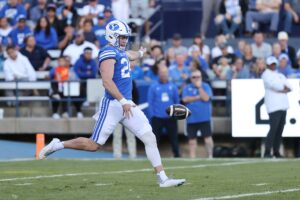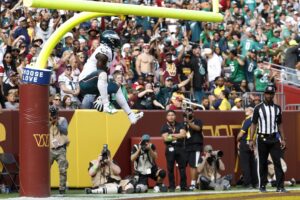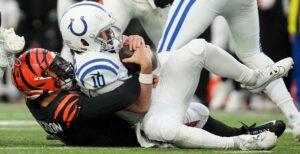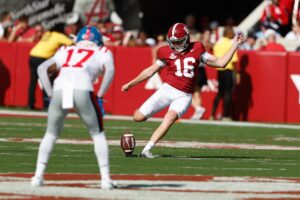The year was 1965 and times were tense to say the least. The 1965 AFL All-Star game was played on January 16th, 1965 in Houston, Texas instead of New Orleans. The West All-Stars won 38-14, but the weeks leading up to the game were impactful in integrating the NFL . Moreover, the stories culminated a long lasting effect on African American players for years to come.
The 1965 AFL All-Star Game Boycott in New Orleans Led to Change
HBCU Players Entered the NFL
The choices of a few men changed the perception of the talent level among players from HBCU schools and it has not received the appropriate attention. Also, the courage displayed 55 years ago started with a closed meeting which continues to impact many of players to this day.
The city of New Orleans proved to be an excellent place to stage an event like the 1965 AFL All-Star game after the Civil Rights Act was passed the year before.
The reasons made sense. The Sugar Bowl between an integrated Syracuse team played LSU two weeks before. Ironically, the business establishment relished the opportunity after the success of the Sugar Bowl. Not to mention, the city of New Orleans made perfect sense for a future NFL franchise.
To grasp the situation a bit deeper, at the time the NFL and the AFL were two separate entities. The AFL was originally thought of as a mere irritation for the NFL. It definitely was not considered to be a serious threat to the more established NFL. In 1960 the AFL started going after players from smaller HBCU schools with players of color, who the NFL felt were not talented enough to play in their league.
Buck Buchanan Led by Example
However, in 1963 the Kansas City Chiefs drafted a Grambling stand out named Buck Buchanan. Buchanan would eventually make it to the NFL Hall of Fame. He became the first overall pick for the Chiefs. Surely, all eyes were on Buchanan. No one from an HBCU school like Grambling was ever picked that high in the NFL draft. The Chiefs knew something others didn’t. Or, they simply had the guts to make the selection. Either way, the pick signified the legitimacy of players from smaller schools, especially African-Americans who received very little name recognition from the NFL. And Buchanan dominated right from the start!
Hank Stram said the following of Buchanan:
“Buck Buchanan kind of revolutionized the play of the defensive tackle position. Normally, the ends were pass rushers and the tackles were run stoppers. Buchanan was a man standing at 6-foot-7 weighing 300 pounds and no one could stop him.”
Buchanan Earned Respect
The impact was felt not only by the Chiefs. Other players took notice too. Buchanan was a giant of a man on and off the field. Trying to get ahead by breaking the rules were simply not tolerated. Buchanan felt players like him needed to be squeaky clean and play the game the right way.
Denver Broncos running back Floyd Little was on a rival team of the Chiefs and he remembers an incident playing a game against the Chiefs one day.
”Gene Upshaw’s brother, Marvin Upshaw, played for the Kansas City Chiefs and we played them one afternoon. I made a cut off tackle and faked Marvin out of his pants. I ran about 18 yards and Marvin came and dove on me after the play to try and injure me,” Little said. “All I can remember is Buck grabbing this big defensive tackle in the back of the neck and holding him off the ground. I’m still lying on the ground and I can see this.”
“Buck Buchanan says you can’t do this to this guy! He’s one of us. Dagget, you should’ve got him back up there. You don’t come down there and try and bury him. I don’t want to ever see you do that again.”
Little was absolutely shell-shocked and shook his head and said “Wow!”
Unexpected Resistance
So speed up a couple years to 1965. The AFL planned to play their All-Star game in New Orleans at Tulane Stadium. Everyone seemed to be excited. The players were told the city was ready. Running back Clem Daniels from the Oakland Raiders was one player who was excited. “They told us to bring your wife and kids. There will also be a golf tournament. It sounded like a big picnic,” Daniels said.
Unfortunately, the planning commission was ill advised. Players arrived on time at the airport. Unfortunately, the cab drivers refused to pick up the players of color. Or the drivers dropped them far from their destinations. Everything from restaurants to nightclubs refused their entrance.
The 21 African American players called a meeting at the Roosevelt Hotel. The players voiced the frustrations from the mistreatment and made a choice that night. They decided against playing in the the All-Star game if the game were to be held in New Orleans. San Diego Chargers tackle Ron Mix then spoke out and was one of the first white players to do so and voice his support for the boycott. The AFL commissioner Joe Foss concluded the game had to be moved.
Dave Dixon (the head of the group sponsoring the game) assured the commissioner New Orleans was ready. But there were complex issues that were not addressed. Foss made a statement which gave the players support.
“Dixon assured me that New Orleans was ready in all aspects for a game between racially mixed teams. Evidently it wasn’t,” Foss said.
New Orleans Changed With the Times
The 1965 AFL All-Star Game was moved to Houston. That moment put a bad mark on the city of New Orleans. On the other hand, it put the important issue of race to the forefront and New Orleans ended up getting an NFL franchise in 1967.
Sacrifice for the Greater Good
The players who boycotted made a stand which could have derailed their careers. It could have easily backfired and proved detrimental to the cause they stood for.
No one can ever understand the sacrifice of standing up for something they believed in. The players were not concerned about what it meant for their brand. And even though no endorsements were at risk, the legacies of the players were. In the end, the players won by staying the course in the face of adversity. When they walked out of that room, there had to be uneasiness. Sometimes in life the right thing to do is difficult, especially, when you’re in the minority.
Main Photo






